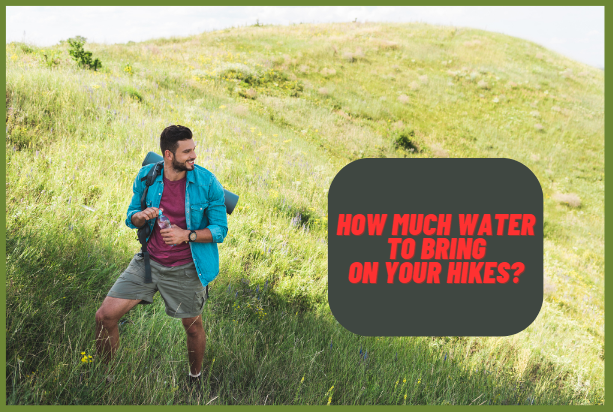How Much Water to Bring On A Hike? Full Guide

A practical rule to keep in mind is to carry 1 liter of water for every 2 hours you will be hiking. Now, considering the typical duration of an average day hike, which falls between 3 to 8 hours, you can estimate your water needs accordingly.
For day hikes within this range, it is recommended to bring 1.5 to 4 liters of water to ensure you stay properly hydrated throughout your outdoor adventure.
Staying properly hydrated is crucial for anyone venturing into the great outdoors. Whether you are hiking, camping, or engaging in any outdoor activity, understanding your water requirements is essential for a safe and enjoyable experience.
Below, we will explore factors to consider when determining your water needs, general guidelines for hydration, and effective strategies to prevent dehydration. From natural water sources to water treatment methods and lightweight water bottles, we will equip you with the knowledge to stay hydrated during your adventures and make the most of every moment in the wild.
The amount of miles you will be hiking will play a big role in how much water you will need to bring. Below is a table with the amount of time it takes to hike a certain amount of miles
| How Many Miles |
Flat To Gradual Hike Takes |
| 2 |
40 - 45 minutes |
| 3 |
1hr - 1 hr 15 minutes |
| 4 |
1 hr 20 minutes - 1 hour 40 minutes |
| 5 |
1 hr 35 minutes - 2 hrs |
| 6 |
2 hrs - 2 hrs 25 minutes |
| 7 |
2 hrs 15 minutes - 2 hrs 50 minutes |
| 8 |
2 hrs 35 minutes - 3 hrs 15 minutes |
| 9 |
2 hrs 55 minutes - 3 hrs 40 minutes |
| 10 |
3 hrs 15 minutes - 4 hrs |
| 11 |
3 hrs 30 minutes - 4 hrs 30 minutes |
| 12 |
3 hrs 55 minutes - 4 hrs 55 minutes |
| 13 |
4 hrs 10 minutes - 5 hrs 15 minutes |
| 15 |
4 hrs 50 minutes - 6 hrs 5 minutes |
Info source: TrailsNH
Determining Water Requirements
Before heading out on your outdoor journey, it's essential to assess your water requirements based on various factors. Factors to consider include:
- Physical Activity: The intensity and duration of your activity will directly impact your water needs. Longer and more strenuous activities will require a higher water intake.
- Climate and Weather: Hot and humid conditions increase water loss through sweating, necessitating a higher water intake to stay hydrated.
- Individual Factors: Age, body size, metabolism, and overall health can affect water requirements. Listen to your body's signals and adapt accordingly.
General Guidelines
While individual hydration needs may vary, here are some general guidelines to follow:
- Pre-hydrate: Drink water before you start your outdoor activity to ensure you begin well-hydrated.
- Drink Regularly: Sip water throughout your adventure rather than gulping it all at once.
- Monitor Urine Color: Aim for pale yellow urine, a sign of adequate hydration.
- Hydration Breaks: Take short breaks to drink water regularly, especially during physically demanding activities.
Dehydration Risks and Prevention
Dehydration can pose significant risks, from impairing physical performance to affecting cognitive abilities. To prevent dehydration:
- Know the Signs: Familiarize yourself with the signs of dehydration, such as dry mouth, fatigue, and dizziness.
- Set Alarms: Use alarms or reminders to prompt you to drink water regularly during your adventure.
- Limit Diuretics: Minimize consumption of diuretic substances like caffeine and alcohol, as they increase fluid loss.
Water Sources and Treatment
In outdoor settings, finding safe water sources is crucial. Consider the following:
- Natural Water Sources: Lakes, rivers, and streams can serve as water sources, but always treat or filter the water before drinking.
- Water Filters and Purifiers: Invest in portable water filters or purifiers to remove harmful contaminants and ensure safe drinking water.
- Reducing Water Weight: For backpackers and hikers concerned about carrying heavy water loads, consider these strategies:
- 1. Lightweight Water Bottles: Opt for lightweight and collapsible water bottles to reduce the burden of carrying water.
Hydration Bladders
Use hydration bladders that can be integrated into your backpack for easy access to water.
Other Strategies
Additional tips to stay hydrated and conserve water during outdoor adventures:
- Eat Hydrating Foods: Consume fruits and vegetables with high water content to supplement your fluid intake.
- Strategic Rest Stops: Take breaks in shaded areas to minimize water loss through sweating.
Hydration is the key to enjoying a safe and fulfilling outdoor adventure. By understanding your water requirements, adopting preventive measures, and using effective hydration strategies, you can stay well-hydrated and make the most of your time in nature. Prioritize your hydration needs, respect the environment, and embark on memorable outdoor journeys fully equipped with the knowledge to stay hydrated and healthy. Cheers to safe and exhilarating outdoor experiences!
Related Posts
Subscribe
Stay updated with our newsletter
Conclusion
The amount of water you need to bring on a hike depends on a number of factors, including the length of the hike, the weather conditions, and your physical fitness level.
As a general rule of thumb, you should plan on drinking 1 liter of water for every 2 hrs of hiking in moderate conditions.
If you are hiking in hot weather or at high altitudes, you will need to drink more water.
If you are not physically fit, you will also need to drink more water.




